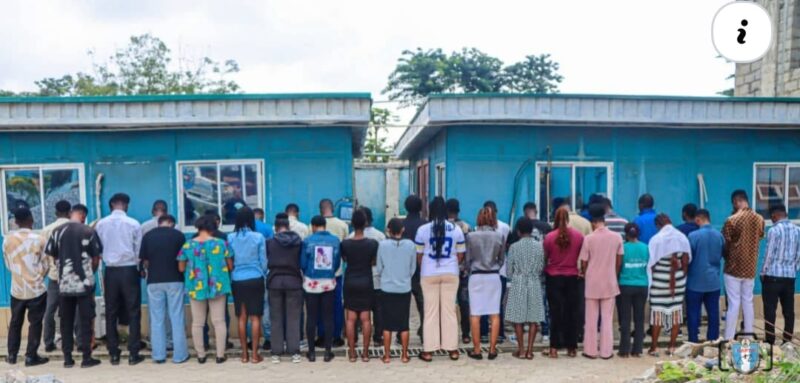The National Agency for the Prohibition of Trafficking in Persons (NAPTIP) has uncovered and dismantled a human trafficking ring operating between Nigeria and Ghana. Eight suspects were taken into custody, while 29 victims—mostly young West Africans—were rescued during the operation.
The syndicate was smashed in Gwagwalada, a suburb of Abuja, where traffickers had been running their illegal activities from a discreet apartment. The breakthrough followed an intelligence report from a foreign embassy in Abuja that alerted the Agency to suspicious movements.
This latest success comes only a few days after NAPTIP foiled another trafficking attempt in the Federal Capital Territory, where 25 women were rescued from being trafficked to Saudi Arabia under the guise of domestic jobs.
Advertisement
READ MORE : Adamawa Government Reunites 14 Rescued Children With Families
According to the Embassy, the intervention began after the Ghanaian Embassy raised concerns about one of its nationals who had been trafficked into Nigeria.
The report revealed that the victim was deceived in Ghana with promises of genuine opportunities abroad, only to be exploited upon arrival in Nigeria.
Responding swiftly, the Ghanaian authorities sought NAPTIP’s assistance under existing bilateral agreements and joint anti-trafficking frameworks.
Further investigation showed that the victim had been duped into paying $3,500 to the trafficking syndicate. Once he arrived in Nigeria, the traffickers seized his passport and personal effects, leaving him stranded and vulnerable.
In response, NAPTIP launched an urgent operation in line with its statutory responsibility to prevent trafficking, protect victims, and prosecute offenders in accordance with national and international laws.
During the raid, eight suspects believed to be part of the organised trafficking cartel were arrested. They are currently being profiled and interrogated.
Twenty-nine victims were also freed during the raid. The group included 20 young women aged between 17 and 28, as well as nine men between the ages of 18 and 30. All have since been taken into protective custody.
Authorities recovered the Ghanaian victim’s passport and other seized belongings. Several items linked to the syndicate’s operations—including mobile phones, SIM cards, and financial records—were also confiscated as evidence.
Preliminary findings suggest that the victims, most of whom were living in Nigeria on expired temporary permits, had been trafficked for sexual exploitation and cybercrime activities.
The rescued victims are now being sheltered in a safe house, where they are receiving immediate care. NAPTIP is also working with relevant embassies to arrange support for the foreign nationals among them.
Speaking on the development, NAPTIP’s Director-General, Binta Adamu Bello, OON, condemned the rise of cross-border trafficking networks and the growing number of foreign victims.
She emphasized that the incident highlights the international dimension of human trafficking and the dangers faced by individuals seeking better opportunities outside their countries.
Bello commended the effective cooperation between NAPTIP and the Ghanaian Embassy, noting that the swift sharing of intelligence and coordinated action were key to the operation’s success.
She vowed that the arrested traffickers would face prosecution, reiterating her earlier warning that Nigeria is no longer a safe haven for traffickers.
“We will continue to dismantle these criminal groups, rescue their victims, and bring every offender to justice,” Bello said.
The DG reaffirmed the Agency’s commitment to protecting victims, dismantling syndicates, and strengthening both national and international partnerships to eradicate human trafficking.









